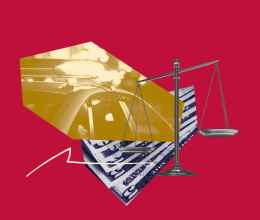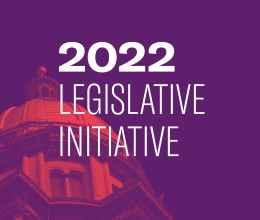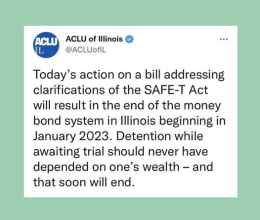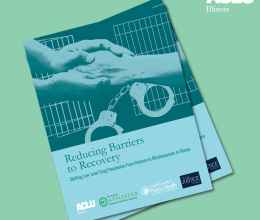Chicago – African Americans in Chicago are far more likely than white residents to be subjected to traffic stops by the Chicago Police Department, according to a new study released today. The study also finds that African American and Latino motorists are far more likely than Caucasian motorists to be searched during CPD traffic stops, yet white motorists are far more likely to be caught with contraband. The study, released by the American Civil Liberties Union of Illinois, is based upon analysis of 2013 data from the Illinois Department of Transportation that documents all traffic stops and resulting searches by the Chicago Police Department.
In 2013, the Chicago Police Department conducted a total of 100,676 traffic stops. Of those, 46 percent were of African American drivers. Since African Americans comprise only 32 percent of the Chicago city population, the data reveals that African Americans are stopped at a rate 42 percent more often than indicated by their share of the city population. In comparison, 32 percent of the Chicago population is Caucasian, but the traffic stop rate for Caucasians is 27 percent.
Additionally, the rate at which minorities are stopped by the CPD is even higher in districts that have a predominately Caucasian population. In the nine police districts most heavily populated by Caucasian residents, African American motorists are over-stopped at rates ranging 52% to seven-fold above their population. In the five majority-Caucasian police districts, Latino motorists are over-stopped at rates ranging from 10% to more than two-fold above their population. In the Jefferson Park police district, for example, African American motorists are stopped at a rate of more than seven times the African American population in that community.
“This data reveals a stark truth – if you are African American, you are far more likely than white motorists to be subjected to a traffic stop by the CPD,” said Adam Schwartz, senior staff counsel at the ACLU of Illinois. “It also is a reality that the tendency of CPD to over-stop African American motorists increases in the parts of the City that are predominantly white.”
The ACLU’s study reveals that the racial disparities go far beyond the initiation of traffic stops. In four different kinds of searches during these stops (car searches by consent, car searches on other grounds, driver searches by consent, and driver searches on other grounds), African American and Hispanic motorists were three to five times more likely than white motorists to be searched. Yet in all four kinds of searches, Caucasian motorists were far more likely than Latino motorists (34% to 170%) to be caught with contraband. In three of these four kinds of searches, Caucasian motorists were also far more likely than African American motorists (65% to 110%) to be caught with contraband. In the fourth type of search (consent searches of drivers), African American motorists were slightly more likely than Caucasian motorists (6%) to be caught with contraband.
“For a decade, we have shown that drivers of color are far more likely to be subjected to consent searches of their cars, and far less likely to be found with contraband when a consent search takes place,” added Schwartz.
“This pattern holds across three additional kinds of searches. This data is powerful evidence that police use different standards, depending upon motorist race and ethnicity, when deciding when to perform four different kinds of searches during traffic stops.”
The Illinois Traffic Stop Statistical Study Act, which requires all law enforcement to report data regarding the citizens stopped, was first adopted by the General Assembly in 2003, under the sponsorship of then-State Senator Barack Obama. As President, Mr. Obama has pointed proudly to this legislative accomplishment, noting the critical role this data can play in curbing and preventing the scourge of racial profiling. The data in the ACLU’s report come from the Study Act.
The ACLU report concludes with a series of recommendations about ways to remedy the kinds of racial disparities in police activity identified in this report. The Study Act, which will expire in a few years, should be made permanent. It should be expanded to pedestrian sidewalk stops, another area of police activity that often results in racial disparities, both in Chicago and in other places like New York City and Newark, New Jersey. Consent searches during routine traffic stops should be abolished. Police should wear body cameras, subject to necessary privacy safeguards. And police should issue a receipt or other document to all civilians they interact with, to advance accountability after the encounter.






